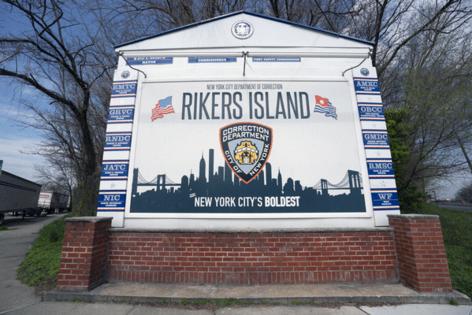Judge stops NYC Mayor Adams' administration from letting ICE on Rikers Island for at least another month
Published in News & Features
NEW YORK — A Manhattan judge is blocking Mayor Eric Adams’ administration from letting federal immigration agents operate on Rikers Island for at least another month, extending a temporary restraining order barring the controversial effort from moving forward.
The restraining order was first issued Monday by Judge Mary Rosado in response to a lawsuit from the City Council alleging the mayor’s effort to allow ICE agents on Rikers is part of a “corrupt” quid pro quo he entered into with President Donald Trump’s administration to get his federal corruption case dropped.
In a Manhattan Supreme Court hearing Friday afternoon, Rosado ruled the restraining order should stay in place at least until the next hearing in the case. She didn’t immediately schedule the hearing, but said it won’t be for at least another month.
The restraining order says City Hall can’t let feds onto the island, or even start negotiations with Trump’s administration about the terms under which ICE agents would be allowed to operate at the infamous jail.
Before Rosado’s ruling, lawyers for the Council argued the freeze was necessary to prevent “irreparable harm” from being carried out on Rikers and within immigration communities.
Daniel Kornstein, a lawyer for the Council, said opening the door to ICE would mean ramped deportations not just of those convicted of serious crimes, but also accused of more minor infractions.
He said Adams’ alleged quid pro quo with Trump’s administration creates “a bad taint that can’t be cured” over the order.
“It’s for an ulterior purpose: It’s not for criminal enforcement, it’s to expand and drum up deportations,” Kornstein said of the executive order Adams’ administration issued last month to let ICE on the island again.
ICE used to have an office on Rikers where it coordinated deportation actions until 2014, when the city strengthened local sanctuary laws to bar federal immigration enforcement at the island jail, where a majority of inmates are awaiting trial and haven’t been convicted of any crimes.
Jim Catterson, an attorney for the mayor, told the judge the Council had failed to prove any immediate harm: “All this is nothing but speculation.”
“This is nothing more than a political statement masquerading as a petition,” he said.
Adams has denied entering into a quid pro quo with Trump.
The president’s Justice Department officials secured a dismissal of Adams’ corruption indictment this month after informing him they expected the quashing of the case would allow him to play a larger role in helping Trump target undocumented New Yorkers for “mass deportations.”
Adams announced he would seek to let ICE back on Rikers shortly after Trump’s administration first moved to end his case, and the judge presiding over his indictment wrote in an opinion that the dismissal “smacks” of a political “bargain.”
The Council sued the mayor last week over the executive order, claiming the move was the “poisoned fruit” of a “corrupt” deal with Trump. The Council’s suit also argues the order, signed by First Deputy Mayor Randy Mastro, is invalid on its face because it broke procedure laid out by the City Charter requiring the mayor himself to issue such a directive.
After Friday’s ruling, Council Speaker Adrienne Adams lauded Rosado.
“With today’s decision, the court has now ruled twice against Mayor Adams’ illegal executive order that conspires to sell out New Yorkers, and we look forward to the court’s consideration of our request for a preliminary injunction,” the speaker, who is running for mayor this year, said in a statement.
Spokespeople for the mayor did not immediately return requests for comment.
Besides the presiding judge’s concerns about a “bargain,” the Trump DOJ’s intervention in Adams’ criminal case set off waves of resignations from the feds who prosecuted him, including then-acting Manhattan U.S. Attorney Danielle Sassoon, who wrote in a letter that the dropping of the charges was a product of a corrupt deal with the president.
Mastro issued the administration’s Rikers-related executive order late April 8.
According to the mayor’s office, the directive is in compliance with local sanctuary laws because it’s tailored to only permit ICE agents to conduct criminal as opposed to civil enforcement on Rikers.
What that means in practice is that ICE agents can only target immigrants on Rikers if they have federal judicial warrants authorizing their deportation due to serious crimes, like murder and rape. Under the executive order, agents aren’t supposed to be able to target immigrant inmates on the island if they’re only armed with civil deportation detainers.
But Council Democrats and immigration advocates say the Mastro order flouts the spirit of the sanctuary laws in that they fear ICE agents will engage in civil enforcement on Rikers anyway.
They have cited those concerns to the fact that Trump’s administration has shown itself willing to bend various rules as part of its hard-line immigration crackdown, including by targeting even some U.S. citizens for deportation and seeking to revoke the status of green card holders over free speech issues.
Mastro said recently there would be “consequences” if ICE is caught engaging in civil enforcement on the island. However, he and the mayor’s office have declined to say what those consequences might be.
_____
©2025 New York Daily News. Visit nydailynews.com. Distributed by Tribune Content Agency, LLC.







Comments